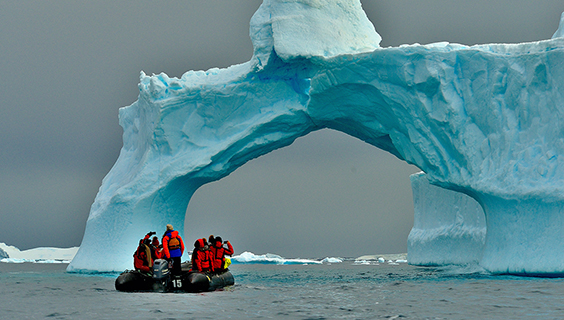
Live Lessons Bring Work Focused on Antarctica to the Classroom
Scholars and scientists from U-M Climate and Space were interviewed for the Antarctica Live Lessons, which aim to inspire young learners with Antarctic science.

Scholars and scientists from U-M Climate and Space were interviewed for the Antarctica Live Lessons, which aim to inspire young learners with Antarctic science.
Bringing the science of Antarctica into the classroom, students and researchers from the U-M Department of Climate and Space contributed their insight to the creation of Antarctica Live Lessons. The new learning resource launched on November 13, 2023, with the goal of engaging and inspiring the imaginations of young learners.
The platform introduces a range of live, interactive lessons about Antarctica, offering a rare opportunity for students to hear from leading ice experts. Developed by the International Thwaites Glacier Collaboration (ITGC) team in collaboration with educational specialists, Antarctica Live Lessons is designed to bring Antarctic science directly into classrooms around the world. The platform features a series of live daily Q&A sessions, which will run for five days from November 27 to December 1, to coincide with Antarctica Day. The website also includes an interactive game for young learners: https://www.antarcticalivelessons.com/
“Discussing what’s going on in Antarctica is pivotal to inspire hope and action,” said Samuel B. Kachuck, a researcher and lecturer at the Ice Dynamics Lab in the U-M Department of Climate and Space Sciences and Engineering.
He was among those who answered questions about Thwaites Glacier and Antarctic science in the Antarctic Week initiative. U-M Climate & Space students Maya Fields and Tanner May were also interviewed for the series, in addition to scholars and researchers from around the world. They appear in the video announcing the live lessons.
In these sessions, students learn various aspects of Antarctic science, with a focus on the specialists working on the Thwaites Glacier in West Antarctica. Students get an introduction to STEM concepts, while also gaining valuable perspective into life and work on the ice. Experts share their own unique experiences, whether they are physically stationed in Antarctica or working remotely to research the issues facing the continent.
“I believe that there is a tremendous power in collective action, and I see scientists, community organizers, and public officials, from our federal government to local cities, working out what we need to know to responsibly respond to climate change,” said Kachuck. “I’m thrilled to be involved in reaching out to the next generation of students and encouraging all of us to collaborate toward that inclusive, respectful future.”